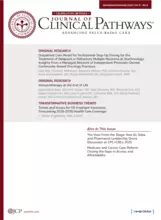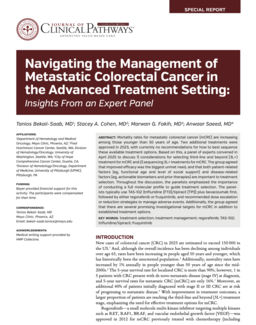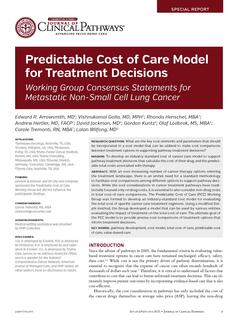Optimizing Dosing Strategy Demonstrates Cost-Effectiveness Among Emerging Treatments for Refractory mCRC
In patients with metastatic colorectal cancer (mCRC) who have exhausted frontline therapies, regorafenib dose optimization (ReDO) may be the most cost-effective treatment strategy when compared with TAS-102 plus bevacizumab (TAS-BEV) and fruquintinib, according to a study published in the Journal of Medical Economics.
“In light of the emerging evidence and treatment options for refractory mCRC, we evaluated relative cost-effectiveness of ReDO, TAS-BEV, and fruquintinib in patients with mCRC from a US payer perspective,” explained Tanios Bekaii-Saab, a Mayo Clinic Comprehensive Cancer Center, Phoenix, AZ, and coauthors.
The researchers used data from key clinical trials—ReDOS, SUNLIGHT, and FRESCO. Clinical endpoints included overall survival (OS), progression-free survival (PFS), and incidence of serious adverse events. A partitioned survival model and various sensitivity analyses were used to estimate outcomes over a 3-year horizon.
ReDO, which starts regorafenib at 80 mg/day and titrates weekly to 160 mg/day, showed the most favorable balance between cost and clinical benefit. In the base case, ReDO yielded 0.576 quality-adjusted life years (QALYs) at a total cost of $130 821. TAS-BEV, by contrast, gained only 0.197 additional QALYs but at an added cost of $109 461, resulting in an incremental cost-effectiveness ratio (ICER) of $554 567 per QALY, well above the accepted $150 000/QALY threshold. Fruquintinib, while comparable in cost to ReDO ($130 902), was associated with lower QALYs (0.517), making ReDO the dominant strategy.
Across scenario analyses, including patients with prior VEGF inhibitor exposure, ReDO remained more cost-effective, especially when the probability of adverse event–related hospitalizations was factored in. Cost-effectiveness acceptability curves also confirmed ReDO as the preferred option at standard willingness-to-pay thresholds.
“While all three treatments offer potential options for patients with refractory mCRC, ReDO is cost-effective compared with TAS-BEV and fruquintinib from the US payer’s perspective,” concluded the study authors.
Reference
Bekaii-Saab T, Cho SK, Hocum B, et al. Cost-effectiveness analysis of regorafenib dose optimization for refractory metastatic colorectal cancer. J Med Econ. 2025;28(1):655-663. doi:10.1080/13696998.2025.2496068
















